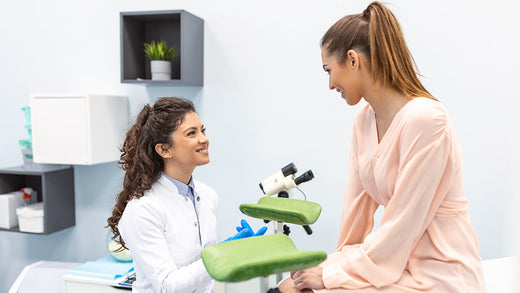Signs & Symptoms of Cervical Cancer & How You Can Reduce Your Risk
Find out moreEight women are diagnosed with cervical cancer EVERY DAY across the UK. The good news is that 99.7% of cervical cancer cases are preventable.
Some fast facts on cervical cancer
Anyone who is sexually active can be infected with the human papillomavirus (HPV), which causes 99.7% of cervical cancers. This virus can infect both men and women. In women, it may lead to cervical cancer, and for men and women, it may lead to cancer of the anus or mouth.
In the majority of cases, the virus (HPV) clears with no harmful side effects, but in a small proportion of individuals, it goes on to cause pre-cancerous and potentially even cancerous changes to the cervix. There are lots of different types of HPV, but the high-risk strains (especially numbers 16 and 18) are more commonly associated with cervical problems.
Although four in five people will be exposed to HPV at some point in their lives, the vast majority of people’s immune systems will clear the virus (HPV) on their own.
Cervical cancer is often thought of as a young woman’s disease. Is this true?
High-profile cases tend to be in younger women, such as Jade Goody; however, cervical cancer is actually more common in older women. Cervical cancer is also very often not talked about, most likely because of embarrassment and the misconception of the cause of the disease.
There are two age peaks for cervical cancer, which are in 30–34-year-olds and 60–64-year-olds. There is actually an increase in cervical cancer incidence after the age of 60, so it is just as important for women aged 50+ to attend their screening appointments as it is for younger women.
What are the five key cervical cancer risks?
- Sexual behaviour
People with a higher number of sexual partners are known to be at increased risk. Condoms are very important in reducing sexually transmitted diseases, but do not wholly protect against HPV, as the virus is present in the whole genital area. Therefore, even individuals who practise safe sex are at risk of contracting HPV, and as such should consider screening.
- Smoking
The combination of smoking and having HPV is more likely to lead to cervical cancer. Women who smoke and have HPV are twice as likely to have pre-cancerous cells in the cervix. 21% of cervical cancers in the UK are linked to smoking.
- Weakened immune systems
A weakened immune system can increase the risk of cervical cancer developing. Women with HIV /AIDS have been found to have a six-fold increased risk, and people who have undergone transplant surgery also have double the risk.
- Family history
Women who have a 1st-degree relative (mother/sister/daughter) who has had cervical cancer have a higher risk of developing the disease. This link does not appear to be straightforward and is believed to be due to similar lifestyles or a shared immune response to the HPV virus.
- Socio-economic status
Cancer Research UK states that the rates of cervical cancer in women in the most deprived areas of England and Wales are three times higher than those of women in the least deprived.
What are the symptoms of cervical cancer?
For effective cervical cancer prevention and risk reduction, it's crucial to be aware of the symptoms to look out for. If you experience any of these, it's essential to consult your doctor immediately. The symptoms to look out are:
- Unusual vaginal bleeding
- Pain and discomfort during sex
- Unpleasant-smelling vaginal discharge
- Bleeding after menopause
- Leg pain
- Pelvic pain
- Weight loss
- Constant fatigue
How to reduce your risk
A number of changes to your lifestyle can significantly reduce your risk of cervical cancer, including:
- Reporting to GP any abnormal bleeding/symptoms
- Being vaccinated against HPV (Human papillomavirus)
- Having regular cervical screening from age 25+
- Stopping smoking – find out more about starting a smoking cessation programme in the NHS by clicking here.
Why is screening so important?
Cervical cancer is almost 100% preventable if you attend regular screening for the human papillomavirus (HPV). One of the highest risks of dying from cervical cancer is missing participating in screening, which is extremely successful for early detection. Smear tests can be scary at the best of times, so if you are still waiting for a postponed smear test from last year, or you’re worried about one that’s due, there are other options.
Our Cervical Cancer Screening Test gives women the autonomy to be in charge of their cervical screening and is especially recommended for women who may have had a bad experience of screening in the past. The NHS now approves HPV testing as a reliable method of cervical cancer screening. If you have never attended the National Cervical Screening Programme, you can still find out if you are carrying the virus, which leads to almost all cases of cervical cancer.
Approximately 10% of those tested using HPVC will test positive for HPV and proceed to a traditional smear test. This means that the vast majority of women who self-test in the privacy and comfort of their own home can avoid visiting the GP or hospital altogether.

Jullien Brady
Clinical Advisor for Cervical Cancer
Consultant Gynaecologist. Professional Clinical Advisor for Colposcopy for Public Health England. Member of the Executive Committee of the BSCCP. Jullien Brady has an international reputation as a leading expert in the field of colposcopy and cervical screening. He is a former National Quality Assurance Director for the NHS Cervical Screening Programme and Professional Clinical Advisor for Colposcopy for Public Health England. He was a member of the Executive Committee of the BSCCP, the governing body of Colposcopy for over a decade. Mr Brady is passionate about women having the opportunity to maximise their health choices and screening options.
Find out moreKnowledge and support
Go to all articles
HPV Awareness Day
The International Papillomavirus Society (IPVS) established March 4th as HPV Awareness Day, in 2018. It provides an opportunity to highlight...
Read more
What is HPV and What are the Symptoms?
Understanding HPV, how it spreads, its symptoms, and how to protect yourself is crucial for maintaining your health.
Read more
Does A Smear Test Hurt?
What happens at a smear test, does it hurt or not, what to do if you experience any side effects...
Read more